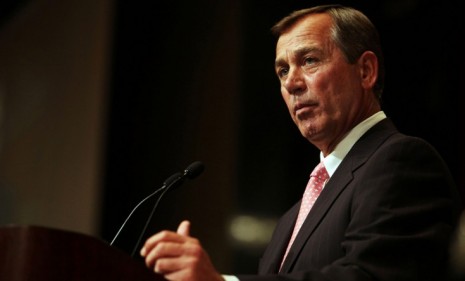John Boehner's 'bold' debt ceiling 'brinksmanship'
The House speaker insists that any deal to raise the nation's borrowing limit is contingent on finding $2 trillion in budget cuts. Is that reckless?

A free daily email with the biggest news stories of the day – and the best features from TheWeek.com
You are now subscribed
Your newsletter sign-up was successful
In a speech to the Economic Club of New York Monday night, House Speaker John Boehner (R-Ohio) laid out his party's demands in the battle over raising the federal debt ceiling. Speaking "to a Wall Street crowd clamoring for compromise on the debt limit," Boehner delivered "a sermon on fiscal austerity." He said Republicans would insist on spending cuts greater than the increase to the debt limit, expected to be about $2 trillion. But with the national debt set to reach its legal limit of $14.3 trillion next week, and financial executives worried about markets cratering over the threat of the U.S. defaulting, Boehner's position is drawing "a cool reception" from Wall Street, and major criticism from the White House. Are Boehner's demands reasonable, or is this just reckless "brinkmanship"?
Boehner finally gets it: This "doozy" of a speech "was a monumental game changer for the GOP" and puts Boehner and his party "back on offense," says Erick Erickson at RedState. After disappointing conservatives and Tea Party backers in his budget negotiations with the White House, the speaker sounds like he "has figured out that he is going to have to lead from the Right." Laying out these hard-line budget demands "is a solid and bold move."
"John Boehner's line in the sand"
The Week
Escape your echo chamber. Get the facts behind the news, plus analysis from multiple perspectives.

Sign up for The Week's Free Newsletters
From our morning news briefing to a weekly Good News Newsletter, get the best of The Week delivered directly to your inbox.
From our morning news briefing to a weekly Good News Newsletter, get the best of The Week delivered directly to your inbox.
Once again, Boehner is bowing to the Tea Party: Boehner showed he's "got chutzpah," says J. Jennings Moss at Portfolio. His position "not only puts him at odds with President Barack Obama and most congressional Democrats," but it also places Republicans "in the rare position of opposing the wants of Wall Street." Obviously, Boehner is feeling pressure from Tea Party members who "are mad as hell and have absolutely no desire to compromise." The Tea Party handed Boehner the speaker's gavel in the 2010 midterms, "and he's not about to cast them aside on their No. 1 issue." If Boehner maintains his hard line, expect another "nasty Washington confrontation."
"Boehner stares down Wall Street on debt ceiling"
And his timetable is reckless: Yes, $2 trillion sounds like a lot, but it isn't "an impossible number," says Ezra Klein in The Washington Post. In fact, all of the major budget proposals being debated in D.C. would cut more than that over the next 10 years, "so Boehner's demands, though impressive in the abstract, are actually in the center of deficit-reduction consensus." It's the speaker's timetable that is "more questionable." As things stand, the government won't be able to pay its bills by mid-summer, and that leaves very little time for cementing such a big and contentious deal. If he doesn't back down, Boehner could create "an extremely extended period of uncertainty" for the markets.
"Wonkbook: Beohner's debt-ceiling demands"
A free daily email with the biggest news stories of the day – and the best features from TheWeek.com
-
 The ‘ravenous’ demand for Cornish minerals
The ‘ravenous’ demand for Cornish mineralsUnder the Radar Growing need for critical minerals to power tech has intensified ‘appetite’ for lithium, which could be a ‘huge boon’ for local economy
-
 Why are election experts taking Trump’s midterm threats seriously?
Why are election experts taking Trump’s midterm threats seriously?IN THE SPOTLIGHT As the president muses about polling place deployments and a centralized electoral system aimed at one-party control, lawmakers are taking this administration at its word
-
 ‘Restaurateurs have become millionaires’
‘Restaurateurs have become millionaires’Instant Opinion Opinion, comment and editorials of the day
-
 The billionaires’ wealth tax: a catastrophe for California?
The billionaires’ wealth tax: a catastrophe for California?Talking Point Peter Thiel and Larry Page preparing to change state residency
-
 Bari Weiss’ ‘60 Minutes’ scandal is about more than one report
Bari Weiss’ ‘60 Minutes’ scandal is about more than one reportIN THE SPOTLIGHT By blocking an approved segment on a controversial prison holding US deportees in El Salvador, the editor-in-chief of CBS News has become the main story
-
 Has Zohran Mamdani shown the Democrats how to win again?
Has Zohran Mamdani shown the Democrats how to win again?Today’s Big Question New York City mayoral election touted as victory for left-wing populists but moderate centrist wins elsewhere present more complex path for Democratic Party
-
 Millions turn out for anti-Trump ‘No Kings’ rallies
Millions turn out for anti-Trump ‘No Kings’ ralliesSpeed Read An estimated 7 million people participated, 2 million more than at the first ‘No Kings’ protest in June
-
 Ghislaine Maxwell: angling for a Trump pardon
Ghislaine Maxwell: angling for a Trump pardonTalking Point Convicted sex trafficker's testimony could shed new light on president's links to Jeffrey Epstein
-
 The last words and final moments of 40 presidents
The last words and final moments of 40 presidentsThe Explainer Some are eloquent quotes worthy of the holders of the highest office in the nation, and others... aren't
-
 The JFK files: the truth at last?
The JFK files: the truth at last?In The Spotlight More than 64,000 previously classified documents relating the 1963 assassination of John F. Kennedy have been released by the Trump administration
-
 'Seriously, not literally': how should the world take Donald Trump?
'Seriously, not literally': how should the world take Donald Trump?Today's big question White House rhetoric and reality look likely to become increasingly blurred